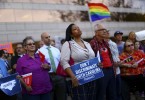So it’s 2016 and we’ve still got quite a climb ahead of us until we reach the top of the hill. As we hold hands walking through the streets of Wilton Manors or Ybor City, it’s easy to forget that the LGBT community outside of its core gayborhoods is anything but equal or safe. Let’s not forget that there are still 28 states—including our own—were it is still totally legal to discriminate against gays and lesbians in the housing market, in hiring, and in shopping. When they put that sign on the wall that said “We Reserve the Right to Refuse Service to Anyone” who knew they were talking about us.
Despite the fact that the vast majority of Americans think that LGBTs have equality now that we can get married in any state, nothing could be further from the truth. And not only in those 28 states, mind you. New York, New Hampshire and Wisconsin brag about their anti-gay discrimination laws, but still allow discrimination against transgenders. Massachusetts and Utah have a hunt a peck approach to protection, and the Federal government is a mixed bag of limited anti-discrimination laws boundd within other items of legislation.
The Democrats have re-introduced legislation to bring national anti-discrimination to all in the LGBT community, despite the fact that its chances of passing through a Republican controlled Congress in an election year are slim.
Representative David Cicilline of Rhode Island, the chief sponsor of the new Equality Act, said he had already been asked why he would push for such an ambitious proposal when ENDA had failed for years. “The answer is that our country is in a different place today, and momentum is on our side,” he told Atlantic magazine. “Partial equality is not acceptable. It’s time for a comprehensive bill that protects LGBT Americans from discrimination in all aspects of everyday life.”
For all the gains made last year by the LGBT community, none was greater than the same-sex marriage win in the U.S. Supreme Court. The irony is that now that gays can wed, they are also exposing their sexual identify in the process every time they do, thereby opening themselves up for discrimination on all other levels, and making the need for Federal laws all the more imperitive.
In the process, the wound that is exposed is religious freedom, and the right to believe what you feel is faith and gospel. To some that is an open-ended invitation to hate. And constitutionally, it is going to be the powder-keg of 2016.
Do not be fooled by the cover story that some legislation has produced, claiming to be aimed at protecting clergy who find it religiously objectionable to perform same-sex weddings. In case you’ve been asleep at the wheel, the Constitution already protects rabbis, imams, and priests from performing ceremonies that are not in accordance with their faith. Forcing an imam to perform a gay wedding is no more realistic than have attempting to force a Catholic priest to wed those who have been previously married. It’s just not going to happen, and shouldn’t happen.
The real intolerance in religious freedom is when it is used as a convenient excuse to not have to perform a publically offered service to everyone who can pay the retail price. If you are a Baptist and can convince yourself that it’s fine to bake a wedding cake for a Russian jew, you are on thin ice when suggesting that you can’t accommodate a same-sex couple for the same nuptial dessert. The thought that you can only serve those with like beliefs can never work in the free market society known as America.
This year, according to Matt McTighe, executive director of the LGBT advocate group Freedom for All Americans, they will be spending between $3 and $6 million toward funding gay anti-discrimination legislation in Florida, Arizona, Indiana and Georgia—the bellwether states for bigots and Bible thumpers. His goal is not to change faith-based agendas, but rather to demonstrate that such faiths can find room within their various doctrines to accommodate equality for all. This is not bending to special interests, but rather realizing that all men (and women) deserve the same compassion and respect regardless of their religion, race, or sexuality.
No, it’s not rocket science. It’s human kindness.
Photo Credit: commondreams.org







